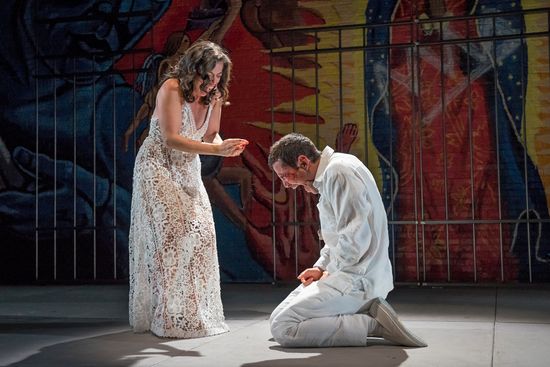Oedipus the King features a cast of compelling characters whose actions and interactions drive the tragic narrative. It is through the complexities of the characters, particularly Oedipus, that the audience is invited to reflect on the human condition, the consequences of our actions, and the profound forces that shape our lives.
Oedipus

Oedipus, the central character and tragic hero of the play, embodies a complex blend of admirable qualities and tragic flaws. He is a proud and intelligent ruler who is deeply committed to saving his city, Thebes, from the plague. Oedipus is determined to uncover the truth behind the plague’s cause, even if it means unraveling his own identity and confronting uncomfortable realities.
However, Oedipus’ tragic flaw is his hubris, excessive pride and self-assuredness. He believes in his own abilities to solve the Sphinx’s riddle and later to unravel the mystery of his birth. Ironically, his pursuit of truth leads to his downfall as he unwittingly fulfills the prophecy of killing his father and marrying his mother.
Oedipus’ character undergoes a profound transformation throughout the play. From a confident and respected ruler, he descends into a state of anguish and self-destruction as he discovers the devastating truth. His blinding self-realization symbolizes his internal torment and serves as a form of self-punishment for his past actions.
Oedipus is a typical Athenian who commits the most egregious of human taboos: incest and patricide. Within the character of Oedipus are both the faults and virtues of the Athenian people. Some critics suggest that Oedipus might be a warning to Athenians that have ushered in a new era of intellectualism. Traits:
- Conscientious and patriotic ruler
- Quick to rage — anger — does not listen to anyone
- Confidence in human intelligence — self-confidence
- Man of action and decisiveness, even if imprudent
- Obdurate — Jocasta says “You’re so unbending” (l. 769).
- Courage in the face of despair
- Impiety — disdainful and supercilious
- Wants to know the truth at all costs
Oedipus falls because of the man that he is, not through some random event in nature or fated outcome. His self-discovery comes at a huge cost: his own destruction. Although the oracle predicts what Oedipus will do, it does not determine the latter’s actions. Oedipus has erred in his faith in human intelligence; there are powers in the universe that are beyond our control and our understanding.
Jocasta

Jocasta, Oedipus’ wife and mother, presents a tragic figure caught in the web of fate and deception. She is initially portrayed as a loving and supportive wife, trying to ease Oedipus’ concerns about his true parentage. Jocasta’s character is also entangled in her own tragic destiny, having married her son unknowingly.
Jocasta’s role in the play is crucial, as she serves as a link between Oedipus and his past. Her attempts to dissuade Oedipus from seeking the truth ultimately lead to her own tragic demise. Her realization of the horrifying truth drives her to suicide, symbolizing the devastating consequences of Oedipus’ actions on those closest to him.
Teiresias
Teiresias, the blind seer, provides a contrasting perspective to Oedipus’ unwavering confidence. Despite his blindness, Teiresias possesses profound insight into the truth and serves as a foil to Oedipus’ intellectual blindness. Initially reluctant to reveal the truth, Teiresias becomes an important catalyst in unraveling Oedipus’ identity and fate.
Teiresias’ character represents wisdom and foresight, challenging Oedipus’ reliance on intellect and reason. Through Teiresias, Sophocles explores the limitations of human perception and the consequences of ignoring prophetic warnings. Teiresias’ presence and revelations add depth to the play’s themes of knowledge, blindness, and the complexities of fate.
Creon
Creon, Jocasta’s brother, is initially portrayed as a loyal advisor to Oedipus. He is a level-headed and diplomatic character who serves as a counterbalance to Oedipus’ impulsiveness. However, as the play progresses and Oedipus’ obsession with uncovering the truth intensifies, their relationship becomes strained. The play hints that while Creon is loyal, there may have existed a rivalry between the characters before the events of the play.
Creon’s character represents rationality and pragmatism. He strives to maintain order and stability within Thebes, advocating for a cautious approach to the search for truth. Creon’s presence highlights the clash between Oedipus’ relentless pursuit of knowledge and the need for measured judgment.
Children
Oedipus and Jocasta have four children together, two sons, Eteocles and Polynices, and two daughters, Antigone and Ismene. However, in the play Oedipus the King, Eteocles and Polynices do not physically appear on stage or participate in the dramatic events, and Antigone and Ismene appear only at the end.
While the children are not directly involved in the play’s action, their existence is significant to the overall tragic narrative. Their births and lineage contribute to the revelation of Oedipus’ true identity, as it is through the investigation of his parentage that the truth about his relationship with Jocasta and the devastating prophecy is uncovered.
In the exodos, Antigone and Ismene emerge as they plead with their father, Oedipus, to have mercy on them. They are deeply affected by the tragic revelations of Oedipus’ true identity and the consequences that befell their family. Antigone and Ismene’s appearance humanizes the family dynamics and adds an emotional dimension to the play’s conclusion.
The fate of the children, following the revelation of their parents’ incestuous relationship, becomes a central concern in the subsequent plays of the Theban Cycle, particularly in Sophocles’ later works, Antigone and Oedipus at Colonus.
Minor Characters
Other characters, such as the chorus and minor figures like the messenger and the shepherd, play significant roles in the narrative, contributing to the atmosphere and offering commentary on the unfolding tragedy. Each character in Oedipus the King brings a distinct perspective, motivations, and flaws, intertwining their destinies and driving the play’s exploration of themes such as fate, free will, and the limitations of human understanding.
